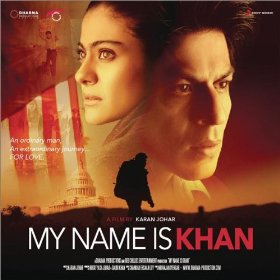My Name Is Khan Soundtrack
 Shankar Ehsaan Loy
Shankar Ehsaan Loy
My Name Is Khan Soundtrack
(Sony Music Entertainment)
Since they teamed up together Shankar, Ehsan and Loy (S E L) have provided several famous soundtracks for movies such as Mission Kashmir, Kal Ho Na Ho, Bunty aur Babli, Rock On and more recently My Name is Khan, a film directed by Karan Johar and starring Shahrukh Khan. As quoted by Khan, it is a film “about a relationship between two people, between an individual and the State, and between an individual and the country. In short, the three important components: love story, Islam and a mild form of autism.”
Because I didn’t watch the film and am aware that the soundtrack is based on situational events of the script, I’m treating this album as more of a journey, an escape. From what I have read about what each puts into this album, Shankar incorporates his Carnatic and Hindustani vocal styling, Ehsan delivers westernised rock and Loy brings in the electronic synths. Altogether the soundtrack contains six songs inspired by the Qawaali songs that originated in Pakistan and North India, as well as four bonus tracks.
The first track, “Sajda,” is a Sufi one that is performed by Rahat Ali Khan with support from Shankar Mahadevan and Richa Sharma; this track merges glorious tabla beats, strings, and dholak into an intoxicating rhythm that seems to contain all the elements that I like about Indian music. The second track, “Noor E Khudha,” is a soft, pleasing love ballad sung by Adnan Sami, Shankar Mahadevan, and Shreya Ghoshal. In this song, S E L arrange a Qawaali rhythm through the use of an acoustic guitar, creating a fresh-sounding melody that complements Adnan Sami’s haunting vocals. I find this particular track very moving.
The third and fourth songs, “Tere Naina” and “Allah Hi Raheem” are Qaawali numbers which contain repetitive but enchanting rhythms. “Tere Naina” is quite theatrical and romantic, with subtle orchestration, and it has a very infectious way about it. “Allah Hi Raheem,” on the other hand, has a strong male chanting chorus which focuses on Islam, a fundamental part of this film’s story. Shafqat Amanat Ali’s vocals and Rashid Khan’s enigmatic voice create memorably moving melodies. Traditional instruments, such as the harmonium, the tanpura, the sarangi, and the tabla generate a profound and lasting effect upon the listener.
The fifth song, “Khan Theme,” is entirely instrumental and delicately beautiful. Finally, the song “Rang De” is the only song that isn’t a Qawaali number but more of a rock number. Overall, the score intends to capture the intensity of this epic story, and the songs are diverse and beautifully inter-weaved into one another.



